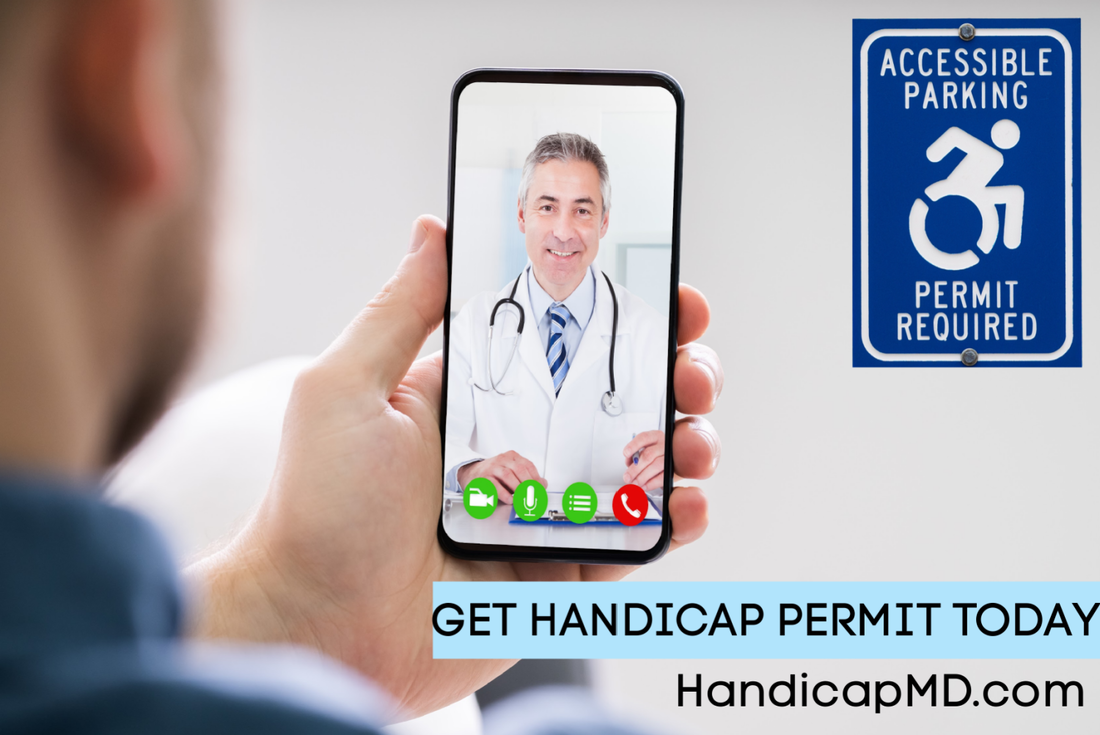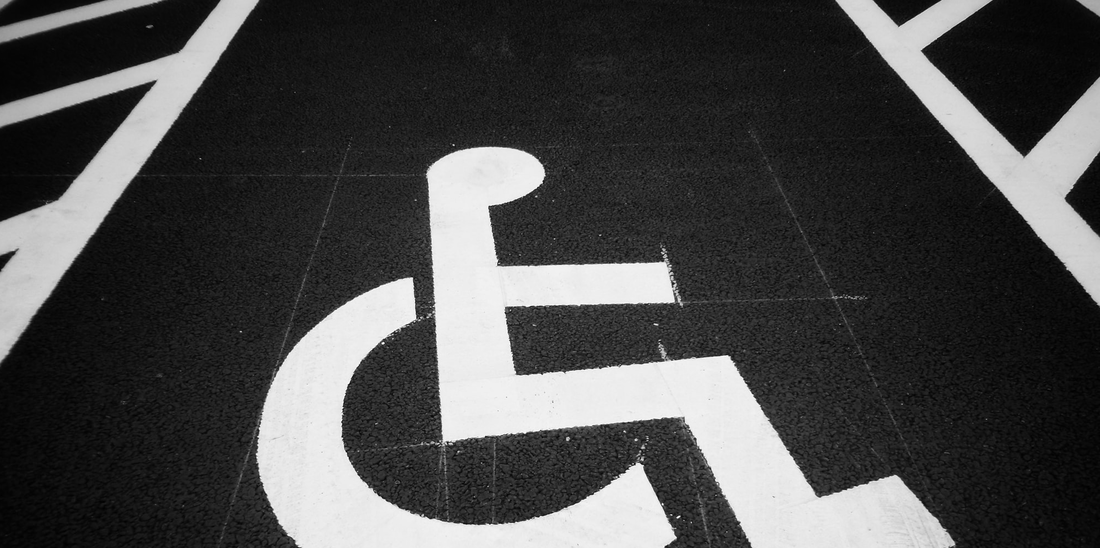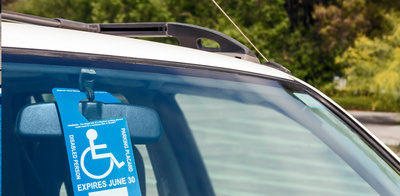
Qualifying Diseases / Conditions / DMV Handicap Permits: Neurological Disease and DMV Handicap Permits in California
Have you been thinking about getting a handicap placard because of a certain neurological condition? If you have, you are not alone. In fact, there are a number of neurological diseases which may qualify you for a disability sticker for your automobile. If you are trying to get a California handicap parking permit, you will need to fill out a Form 195. While the laws vary concerning what qualifies you for handicapped parking from state-to-state, many states have similar requirements to those listed in California.
Medical content reviewed by Dr Eric Jackson-Scott MD, Chief Medical Officer 
How to Get a DMV Handicap Placard for Neurological Diseases
Your first step to getting a California disabled person placard is getting a definitive diagnosis from your doctor. If you suspect that you are suffering from some type of neurological disease, you must first see a physician and get a diagnosis. In many cases, your regular physician will send you to a specialist in order to better determine exactly which type of neurological disease you have and how best to treat it. More information about certain diseases will be provided in another paragraph. For now, you need to know that this will be the first step in establishing your eligibility. From there, it is then necessary to fill out the Form 195 (https://www.dmv.ca.gov/portal/file/application-for-disabled-person-placard-or-plates-reg-195-pdf/) if you are in the state of California.
Eligibility for an Accessible Disabled Persons Parking Placard for Neurological Diseases
Your eligibility for a disabled persons parking placard in California will largely be determined on exactly which type of neurological disease you are suffering from, as well as its severity (https://www.dmv.ca.gov/portal/dmv-virtual-office/dpp-application/). For example, a person who is suffering with severe Alzheimer's disease may not be able to drive at all, as it eventually becomes unsafe to do so. However, someone else who is suffering from a different type of neurological disease, such as muscular dystrophy, may well qualify for a handicap placard. Muscular dystrophy often makes it difficult for a person to walk. In some cases, the individual in question is forced to walk with a cane or even use a wheelchair. Therefore, that individual is more likely to qualify for a handicap placard than a person who may need to give up driving for safety reasons or who has a neurological condition that can be successfully managed with medication.
Handicap Parking Permits in California: How to Get One

As previously mentioned, the rules are slightly different in every state. Within the state of California, you will first get a diagnosis from your doctor, which will most likely mean an appointment with the specialist to better determine exactly what type of condition you have and how it can best be managed. If the doctor and the specialist both agree that your condition cannot be successfully managed with medication alone and they both agree that it is still safe for you to drive with assistance, then you may be able to apply for a handicap placard. By filling out the form and providing the required documents from your physician, you may be able to obtain a placard which will allow you to access handicap parking.
How to Apply for a California DMV Handicap Parking Permit for Neurologic Diseases
Again, it is impossible to apply for a handicap parking permit for neurologic diseases without first getting a definitive diagnosis from a qualified physician. In almost every case, your regular physician will refer you to someone who is better able to determine exactly which type of neurologic disease you are suffering from. The goal is to get to the bottom of things in order to better determine why you are experiencing symptoms and how best to treat those symptoms. While most neurologic conditions get worse over time, some can be successfully managed with medication. However, it is imperative that the medication you are taking not impair your driving. If your physician and any specialist that he or she refers you to can agree that it is still safe for you to drive, you may then apply for a handicap placard. After your application is approved, you can start using it and access parking that is closer to public buildings as opposed to having to walk the distance of the parking lot on a routine basis. It is common for people to wonder how do I renew my handicap placard in California.
Why You Should Consider a Handicap Parking Placard for Neurologic Diseases
Why should you consider getting a handicap parking placard if you have a neurologic condition? There are a number of reasons, not the least of which involves the possibility of becoming physically unable to walk. If you are using a cane to walk or you are in a wheelchair, you don't want to be forced to park several feet away from a public building in order to gain access. It's also worth mentioning that putting too much physical stress on your body can potentially make neurologic diseases and other conditions worse. Therefore, it is much better to consider getting a handicap parking placard so that you can mitigate the physical stress on your body to the best of your ability. This in turn can potentially help you better manage your condition, not to mention keeping you safer because you aren't trying to walk when you are struggling to do so.
Types of Neurologic Diseases
There are many different types of neurologic diseases that can potentially cause problems. These diseases include epilepsy, Parkinson's disease, Alzheimer's disease, muscular dystrophy, Huntington's disease and meningitis. This is by no means an all-inclusive list. Some of these diseases may preclude you from driving in any capacity such as epilepsy and Alzheimer's. In other cases, such as with Parkinson's disease, muscular dystrophy and some patients with Huntington's disease, it is still possible to drive even though your mobility may be limited. The same is true for those individuals who have recovered from meningitis and are suffering from prolonged effects. The thing that all of these conditions have in common is that they tend to affect the way the body moves. As a result, it isn't as easy to stand or walk once a person starts exhibiting severe symptoms from these types of diseases. That is precisely why you may want to apply for a handicap placard. Almost all neurologic diseases eventually affect the way the body moves and the way it responds to commands. Breathing can also be affected.
Talking a HandicapMD Doctor Getting Your DMV Placards or Permits - New or Renewals
If you have concerns, the first thing you should do is talk to your doctor. The two of you can then figure out which steps are appropriate to take next. Since you will need documentation from your doctor in order to submit your form, it's a good idea to go ahead and have that discussion, even if you only suspect that something is wrong. That way, you're not wasting valuable time once you do have a diagnosis. Our HandicapMD experts will fill in and sign the Medical Provider’s Form of your application REG 195.
| VISION | RESPIRATORY | CARDIAC / HEART |
| MOBILITY | NEUROLOGIC | LIMB LOSS / AMPUTEE |
| ARTHRITIS | OSTEOARTHRITIS | INFLAMMATORY |
.png)





